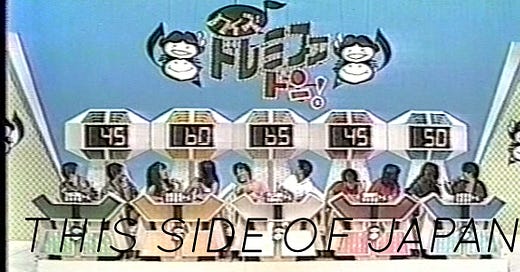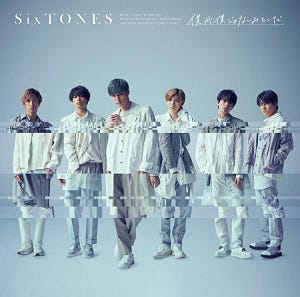Issue #28: Beef or Chicken?
This flipped issue goes long on Teriyaki Boyz's debut album; highlights Black Biscuits, the Jet Set Radio OST and Yoshiyuki Ohsawa; and reviews the new SixTones single
Hi! Welcome to This Side of Japan, a newsletter about Japanese music, new and old! This issue is a flipped edition, meaning we’re doing the opposite of the original format: we cover an older album and three older singles plus the newest entry in the Oricon. You can check out previous issues of the newsletter here.
To probably no one’s surprise, one of my favorite Japanese variety shows is the music quiz show Quiz Do Re Mi Fa Don! The program basically has its celebrity guest contestants guess the song just from hearing the intro of a song. While it stopped airing on a regularly weekly block a few decades ago, it’s periodically brought back as a seasonal special. I don’t know why American TV stations haven’t adapted yet a la The Masked Singer.
My mom is pretty good at guessing the questions right. I pretty much watch these music intro quizzes whenever she has them on, and she’s next to me either shouting the titles or holding her head because the title is at the tip of her tongue. The pool of songs span a wide range in chronology, from the early ‘70s to today, but they’re all sure pop hits. I’m always impressed whenever she gets anything right from the mid-2000s on because I had no idea she has kept with J-pop all this time since we moved to the United States.
I, on the other hand, am not that great. Maybe a few ‘90s songs, some very recent ones like an Aimyon song, but I draw a blank for a lot of what is given. It’s a humbling experience, really. I listen to all this music day in and day out, but I still have so much to learn when it comes to the pop hits, songs that are more commonly known or at least ambiently existing among the Japanese public. It’s a situation I bring up again and again: it’s like I can list you Pitchfork’s 50 best tracks of recent years but I have no idea who Mariah Carey is.
It’s part of why I enjoy working on the This Week Is… section of the newsletter. The goal is to introduce us both to the major hits that a huge portion of the Japanese public is familiar with—or that’s the theory anyway, given the single’s accomplishment making it to number one in the country’s main commercial music chart. Having the knowledge to master these music-quiz shows is as important to me as learning about the alternative or the obscurities. As someone who also use music as a window into Japanese culture, I want to get in touch with what’s popular as much as the underground.
***
Like I noted, this is another flipped issue of This Side of Japan. This issue’s Album of the Week and Singles Club cover releases from past decades while This Week in… highlights the newest Oricon chart-topper by the time of writing. I want to periodically utilize these flipped issues to take a break from the new and explore older Japanese music. Hopefully you find something new from these as well.
Last week, we also launched Hyadain Week, a feature to cover 10 essential tracks from the last decade by the influential producer. You can start with the intro here. Thanks to anyone who checked it out!
Album of the Week
Beef or Chicken by Teriyaki Boyz [(B)ape Sounds / Def Jam, 2005]
Recommended Track: “Heartbreaker”
Before Fast and Furious: Tokyo Drift and the Kanye West collaboration, the four rappers of Teriyaki Boyz first assembled for the compilation album (B)ape Sounds. The Bathing Ape had entered its first decade as a streetwear brand in 2003. Mastermind Nigo and his hip-hop-inspired apparel pieces had courted a crowd of musicians from both Japan and America. Hometown heroes Scha Dara Parr wore the hoodies; Pharrell and Clipse spread the word in the States. With the Ape starting to infiltrate rap in both sides of the Pacific, it only made sense for Nigo to further participate in the genre going into the new millennium.
Verbal, Ryo-Z, Ilmari and Wise were one of the many rappers called up to turn in a track on Nigo’s album. “He called me one day and was like, ‘yo, do you want to do something with DJ Shadow,’” Wise recalled about getting phoned by former classmate Ilmari, who had already made it big in Japan’s rap scene with Ryo-Z and two other MCs in the group RIP SLYME. Along with Verbal, a star in his own right through his group M-Flo, out came “Kamikaze 108,” credited as a new separate group called Teriyaki Boyz.
While the inaugural track established the group’s old-school-inspired sound, they had yet to indulge on the cartoon-ish humor derived from such a comical name. “We were first joking around,” Wise explained. “We wanted to bring something Japanese but also international to the table. Teriyaki sauce is global: everyone knows about it.” Their debut album, Beef or Chicken, saw the four lean into the silliness expected from a novelty-like project called Teriyaki Boyz — how else to explain a song titled “Moon the World”? — but the rappers took their craft seriously, balancing goofing off with a sincere love for hip hop rooted all the way back to the genre’s origins.
Though the group was essentially a side venture for both the members and the Bathing Ape, calling Teriyaki Boyz a pet project would be understating the scale in which Nigo dreamed up the debut album. He got contributions from an impressive series of overseas talent: Just Blaze, DJ Premier, the Neptunes, a Swishahouse remix of “Kamikaze 108” by Michael 5000 Watts, and — perhaps the most surprising — Daft Punk to name a few. Before those beats even play, the group earns its stamp of approval through a exclamation-heavy guest intro by Ad Rock. “Hey, o-machi!!!!!” The Beastie yells in broken Japanese over a wobbling bass beat that recalls the outro of “The New Style.”
Teriyaki Boyz first establish their deft grasp on emceeing before they let loose with unadulterated fun. The four rock a classic rap routine in the Mark Ronson-produced “The Takeover” in spirit of the early greats such as the Treacherous Three or Funky 4 + 1. Ilmari and Ryo-Z already mastered this first-wave style in their main group RIP SLYME, bringing a pop version of the form to the masses as well as the top 10 of the Oricon. While their late ’90s records looked to the Native Tongues, SLYME smoothed out their early 2000s output into raps reminiscent of the block-party revivalism that a crew like Jurassic 5 also dabbled in at the time.
Verbal, meanwhile, is placed in a different environment than his main group m-flo, a project influenced by hip-hop but also R&B and dance genres like garage and drum ’n’ bass. “Of course, I’m asked for skill, but this work setting calls for something fun or other next level things,” he told Tower Records’s Bounce magazine. “For m-flo, they want style or something for the women, but Teriyaki Boyz is all about jokes and how to make it as fun as possible.” He responds to this new mix by assuming a on-record persona unique to Teriyaki Boyz. “Girls in the club be hot,” he raps like a tipsy frat alum in the Daft Punk-produced “Heartbreaker.” “If my girlfriend finds out, I’m going to get dumped.” Paired with his nasally vocals and nimble flow, he’s easily the most animated voice in the album’s lead single.
During some rare moments, the group pay homage to the country’s own pop culture. The title of “Konya Wa Baggy Pants” pokes fun at the J-pop classic and post-hip-hop breakthrough, “Konya Wa Boogie Back,” and the four inflate a one-note joke based on the title, boasting about baggy pants being their go-to fashion statement: “it fits so many battles of champagne / do you wanna dance with me?” Verbal raps. The m-flo member slyly slides in a few more punchlines riffing on Japan’s cultural staples. “More gin gira gin than Matchy,” he flexes in “Cho L A R G E,” name-checking the Johnny’s idol; “I’m a Leo, but I’m not the Jungle Emperor,” he goes in “Moon the World” with an Osamu Tezuka bit.
Verbal’s small web of references tap into the group’s purported teriyaki sauce philosophy of adding a Japanese flavor to an American cultural dish, so to speak. That said, the group include too few Japan-specific elements like those Verbal lines for their music to really feel guided by such a philosophy. Beef or Chicken instead shows off Teriyaki Boyz as a contemporaneous player of commercial hip hop in the U.S—they stand out by seamlessly blending in. The group is under no obligation to define or be a model for modern rap in Japan; if anything, the album argues it’s almost no different than American rap. “But in a way, it’s a bit experimental, and I like that,” Nigo told Bounce. “It’s a work that shows how Japanese artists can make something like this now.”
Singles Club
“Relax (Vivian Hsu Version)” by Black Biscuits [BMG Japan, 1998]
A strange curio they may seem among chart-topping J-pop in the ‘90s, Black Biscuits follow an origin story repeated since at least Imo Kin Trio. The group functioned partly as a variety-show gag, assembled as rivals to another TV-born pop trio Pocket Biscuits. (The men in each Biscuit were the other halves of two comedian units Kyaiin and Ucchan Nanchan.) And the former three released music to bully the latter off of the charts.
Many comedians participated in the pop music market before with an ambition for one thing or another, though the Biscuits feel like a unique cash-in on their respective fame. For one, there’s an actual competition involved which you can see unfold via the Oricon. With both groups active during the peak CD era, any simple jingle would have perhaps got to the hands of consumers tuned into the primetime block. For all the extra-musical novelty surrounding them, however, Black Biscuits’ singles stand the test of time as genuine pop.
The trio has Komorita Minori to thank. The producer hands Black Biscuits a post-Eurodance R&B track for them to boogie to. The liquid clavichords, the jazzy interludes, and the vocoder ad libs make up a classy retro pastiche that feel at once ‘90s house and ‘70s pop-funk revivalism. Komorita’s sound has found a place in the memory of J-pop as well with him famously contributing the same vibe in “Dynamite” by SMAP a year before he worked with the Biscuits.
Black Biscuits let go of all their problems in the chorus, and the music peaks to accompany that feeling of freedom. “Let’s boogy woogy, a dream wonderland / it’s alright to take it all off,” they shout in celebration. “Let’s stop worrying about it, take a bath and go to bed / ha, why not go at your own pace?” The mundane of daily life trickles in the fantastical jazz-funk like so, highlighting the very silliness in stressing about such trivialities. They boldly title it “Relax” after all.
The lyrics also gain some amateurish charm when sung by Kiyotaka Nanbara and Hiroyuki Amano with the two comedians getting by through sheer will. That said, “Relax” is much complete with Vivian Hsu as the main vocalist. It’s really a shame she’s only relegated to the rap section in the original single version, especially when the trio’s counterpart Pocket Biscuits place their third member as the obvious frontwoman. Hsu competes with not only the latter’s singer, iconic talent Chiaki, but other artists bringing R&B to the charts as well. She takes the ode to relaxing with polished skill but also the breeziness it preaches—she makes relaxing sound within reach yet also a true vacation.
…from LIFE (1999)
See also: “Parachuter” by Folder; “SHAKE” by SMAP
“Let Mom Sleep” by Hideki Naganuma [Polydor, 2000]
Like the collage of subcultures that make up the language of the video game itself, the soundtrack for Jet Set Radio mashes up several hip-hop-adjacent aesthetics into an exhilarating pop rush. Opening track “Let Mom Sleep” sees the album’s chief composer Hideki Naganuma juggling cartoonish loops and colorful sound bites as one zany mix. Strident guitars, horn screeches and loud string hits are all scrambled into a Bomb Squad-like beat; the cop-car sirens, record scratches and James Brown grunts peppered in the production further draw the comparisons close. But while the Public Enemy architects constructed noise music by design, the blunt way in which Naganuma drops the sound over your head recalls the big beat juggernauts like Fatboy Slim making waves during this time.
A few other satellite beat subgenres come to mind whenever I listen to the Jet Set Radio soundtrack. The loop-drunk party-starters of the French house scene. The hip-hop backpackers romanticizing the old school. The turntablists putting together records full of instrumentals. A bit more distant, perhaps, but I also think about Shibuya-kei ur-text Fantasma from how it resembles a cosmic collision of orbitting music. While a pre-millennium anxiety underpinned Keigo Oyamada’s record as a response to the overflow of information, Naganuma’s songs like “Let Mom Sleep” revel in the concept of abundance, thrilled to just throw it all in the mix and watch the whole thing blow up.
…from Jet Set Radio original soundtrack (2000)
“Soshite Boku Wa Tohou Ni Kureru” by Yoshiyuki Ohsawa [Epic Sony, 1984]
I don’t blame the programmers of the drama show Uchi No Musume Wa, Kareshi Ga Dekinai!!—a great series by the way—for reaching over to this Yoshiyuki Ohsawa hit as a shorthand for nostalgic melancholy. The wistful, glassy synths, the somber rhythm and Ohsawa’s own defeated voice all nicely sync with heartbroken Souseki (played by Alexandros frontman Yohei Kawakami), who just got dumped by his longtime girlfriend via text. The following scenes recreate soap-opera cheese, building over-the-top suspense of an ill Souseki swerving away from a near-collision with an 18-wheeler.
That said, as much as the song pairs well with dramatic, heartbreak-inspired theatrics, Ohsawa writes his post-break-up story with deep nuance in “Soshite Boku Wa Tohou Ni Kureru.” He spots his former love completely changed in appearance, perhaps from being invested in a new relationship. Though he lets the bittersweet-ness of the situation linger, he takes reality in stride: “It’s what you chose, so you’re going to be OK / It’s what you decided in your heart / and I’ll be at wit’s end,” he sings in the titular chorus. The Blue Nile-esque music chugs along in perpetuity, accepting the split with a sigh yet never fully in resolution.
…from Confusion (1984)
See also: “Futari No Natsumonagatari Never Ending Summer” by Kiyotaka Sugiyama & Omega Drive (1985)
This Week in 2021…
“Boku Ga Boku Ja Naimitaida” by SixTones [SME, 2021]
No. 1 during the week of March 1, 2021 | Listen to it on YouTube
A divide between SixTones and Snow Man, the two newest Johnny’s acts, has been gradually becoming identifiable since their debut last year. While the latter has been tackling more fashion-forward dance-pop—relative to their company’s notoriously exclusive in-house style anyway—the crew pronounced “stones” have worked in a rather conservative and contemporary realm. Though it displays a change in outlook, SixTones’s new chart-topper “Boku Ga Boku Ja Naimitaida” reinforces this dichotomy of the adventurous and safe between the two sibling groups.
SixTones’s recent full-length, ST, includes some attempts to go outside of their usual field of play, but their front-loaded sequencing mostly paints an impression of the group as an act who favors histrionics and spectacle. Those interests were laid out in the forefront from the get go in their debut record, “Imitation Rain,” with its maudlin, piano-assisted chorus written by none other than X Japan’s Yoshiki. While they work a more upbeat number in the more recent “New Era,” the power-metal riffs and the anthemic, “to the future!”-type chorus still places them in a genre of drama pop.
“Boku Ga Boku Ja Naimitaida” moves more agile than their past releases with the string arrangement adding a sense of momentum. Working in tandem to as-sentimental guitars, the heart-fluttering production traces an arc familiar to anison singles specifically made to fit the opening reel of their respective shows. The made-for-TV feel makes sense given how the song is a tie-up with the shojo manga-turned-film Liar x Liar, starring the group’s own Hokuto Matsumura. “The name of the flower that bloomed from love is called liar,” they sing a pretty on-the-nose lyric in the chorus, clutching their hearts in the video to visually show how they’re just trembling with emotion.
Blame the commercial obligation for their gestures to please, though SixTones tread rather expected waters in “Boku Ga Boku Ja Naimitaida.” Given the obviousness of “New Era,” the romance-drama-inspired premise behind a song with a title that translate to “as if I am not myself” seems up their alley regardless of a tie-up movie. For a production to engineer the very feelings of head-over-heels infatuation, they can’t go wrong with the tried-and-true string-and-guitars combo. “Boku Ga Boku Ja Naimitaida” marks another entry of the group subscribing to pop cliche—melodious and charming but not so groundbreaking.
The next issue of This Side of Japan is out March 10. You can check out previous issues of the newsletter here.
Need to contact? You can find me on Twitter or reach me at thissideofjapan@gmail.com





